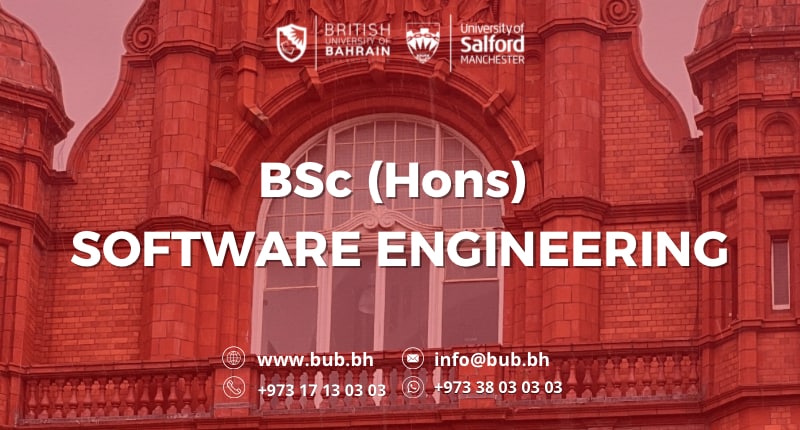BSc (Hons) Software Engineering (International)
COURSE SUMMARY
Computers are an integral part of modern society, with technology touching all aspects of life including commerce, industry, healthcare, communication and recreation. The pace of change and innovation is rapid, and shows no signs of slowing down. Companies of all sizes have an urgent need for people who can create software systems that are usable, robust and maintainable. A degree in Software Engineering will provide you with the practical skills you need to be able to do useful things when you start your career, and with the theoretical knowledge you need to be able to adapt your skills as programming languages and techniques evolve.
You will learn the foundations of programming; Java is our main language (you will also cover Javascript, PHP and C++), but the important thing is to understand the principles of programming that can be applied to any language you need to learn. In industry it is far more common to maintain and enhance existing systems than to create new systems, and you will understand the issues and techniques for doing this.
You will also learn the latest professional techniques and tools such as agile methodology, design patterns, test driven development, HCI and security. You will complete group and individual projects addressing real world problems.
This course will provide you with a broad understanding of computer programming. You will develop an in-depth understanding of methodical approaches to the analysis, design, development, testing and maintenance of object-oriented systems using the Java language. You will graduate with a range of programming skills and a critical awareness of how to select the appropriate skill for a particular task.
Some programming languages have been around for many years, while new languages are appearing and evolving. These days there is a trend for ͞software frameworks͟ to help programmers by providing reusable components for common activities, and these evolve particularly quickly. Keeping up with changes in languages, tools and techniques will require you to keep learning throughout your career. Salford’s degree course will set you up for this by providing strong foundations in how things work, and in how you learn, to help you understand new ideas and adapt to new techniques.
You will develop an awareness of the differences between a professional and amateur approach to carrying out IT projects (both short and long term). Furthermore, we ensure that you are aware of the laws that apply to the IT profession, and that there must be a point when a professional will move outside their competence and need to work with other professionals with other expertise. You will look at the wider social impact of technology, both positive and negative, and we encourage an ethical awareness that not everything that can be done should be done.
On this course, as well as gaining and developing a wide range of computer science knowledge and skills, you have the option to spend a year in industry between the third and fourth year of the course. This is an excellent opportunity to expand your CV and will give you the opportunity to apply your academic knowledge and interpersonal skills in a real-world environment, and to reflect on your own personal development and career choices.
-
PROGRAMME Undergraduate Degrees
-
DURATION 4 years
-
LANGUAGE English
YEAR 1 - FOUNDATION YEAR
The Foundation Year has been designed to bridge the gap between High School and effective Honours Degree Study. The modules focus on the development of key skills, including studying independently and collaboratively, critical thinking, academic and professional writing and quantitative techniques. A key focus of the Foundation Year is a collaborative project, where students will work together to develop solutions to real-world problems.
Modules include:
• Critical Reflection and Thinking
• Human Rights
• Arabic for Business (Arabic Speakers) / Critical Reading (Non Arabic Speakers)
• Multi-disciplinary Project
• Computer Systems
• Applied Mathematics
• The Modern History of Bahrain
YEAR 2
• Computer System Internals and Linux
• Database Systems
• Professional Development and Practices
• Web Development and Human Computer Interfaces
• Programming 1
• Programming 2
YEAR 3
• Software Evolution
• Career Development
• Client Server Systems
• Data Structures and Algorithms
• Design Patterns
• Network and Security
• Software Project with Agile Techniques
YEAR 4
In your third year you will take three compulsory modules, which includes an independent study module. You will also be able to choose two optional modules (from the indicative list below).
Modules may include:
• Dependable Software Engineering
• Software Quality Management
• Project for Software Engineering
OPTIONAL MODULES
• Business Management
• Information Security Management
• Mobile Development
• Virtual Reality and 3D Games
Please note that it may not be possible to deliver the full list of options every year as this will depend on factors such as how many students choose a particular option. Exact modules may also vary in order to keep content current. When accepting your offer of a place to study on this programme, you should be aware that not all optional modules will be running each year. Your tutor will be able to advise you as to the available options on or before the start of the programme. Whilst the University tries to ensure that you are able to undertake your preferred options, it cannot guarantee this.
• Statement of Graduation (Secondary School General Certificate)
• High School Diploma with an overall average of 75% over the last three years of high school (years 10, 11 and 12)
• IELTS Academic Test Score of 5.5 minimum, with a minimum of 5.0 in each component
For Direct Entry
IELTS:
6.0 with no element below 5.5 or equivalent.
A Level:
112-120 UCAS points, to include a grade C in Mathematics, a numerate science or a computer-related subject.
BTEC National Diploma:
DDM from a computer-related subject. Engineering or Science accepted with distinctions in maths modules.
International Baccalaureate:
30 points with 14 in Higher Level subjects.
APPLICANT PROFILE
We are looking for applicants with a strong interest in computing. This implies having an interest in how things work rather than just wanting to be a user of them, and it implies doing things on your own initiative rather than just things you’ve been told to do as part of your coursework.
Strong attention to detail and a good work ethic are important to this course particularly with industrial placement opportunities.






